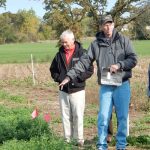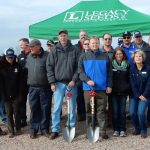Local seed company expanding
By Robert Cloud
When Bruce Ceranske tells the story of his company, he describes the early years as “tough.”
After years of working for multinational ag corporations, Ceranske, Steve Jensen and Tyler Lee wanted to use their experience to build an independent company.
Started in 1999, Legacy Seeds was operated out of their homes.
They eventually rented an old warehouse on Pine Street for $100 a year, then moved into the industrial park in Waupaca, then purchased a facility that had belonged to Anthony Farms.
“I worked in bib overalls for the first seven years we were in business,” Ceranske said. “I drove a delivery truck until about six years ago.”
Today, Legacy Seeds has a dealer network that spans the upper Midwest from North Dakota to Michigan.
Legacy Seeds also has a seed plant in Idaho.
Ceranske said the company has grown by nearly 25 percent a year for the past four years.
It currently employs about 35 people.
On Wednesday, Oct. 11, Legacy Seeds broke ground for alfalfa breeding and research facilities.
The facilities will be located on State Highway 54, east of Waupaca.
There will be a 60-by-120-foot building with labs for research and conference rooms for training. A greenhouse will be built.
Earlier this year, the company literally broke ground when it planted multiple varieties of alfalfa as part of its research efforts.
Dave Huset is Legacy Seeds director of alfalfa research.
He said the goals of breeding are to develop plants that are highly digestible as cattle feed, resistant to disease and provide higher yields.
Standing beside a row of alfalfa, Huset said the process of selecting the right varieties begins in the breeding nursery.
“We start with 800 varieties and get down to between 80 and 100,” Huset said regarding the two-year process in the nursery.
The resulting plants are then sent to Idaho for further selection and pollination.
After further testing, the seeds are then sent out to various locations to discover how well the plants thrive in different conditions and soils.
From initial breeding to being planted on a farm, it takes about seven years to develop a seed variety.
“The whole program is about helping the dairy farmer get more milk production and be more profitable,” according to Dave Robison, the forage and cover crop manager for Legacy Seeds.
Another major issue for Legacy Seeds is to develop non-GMO varieties of alfalfa.
Huset said bees can carry GMO-contaminated pollen from up to five miles away. The contaminated pollen can then contaminate the seeds.
“We’re constantly testing the plants to make sure they’re GMO free,” Huset said.
Legacy Seeds will also conduct corn, soybean and wheat research on its 25-acre parcel.


